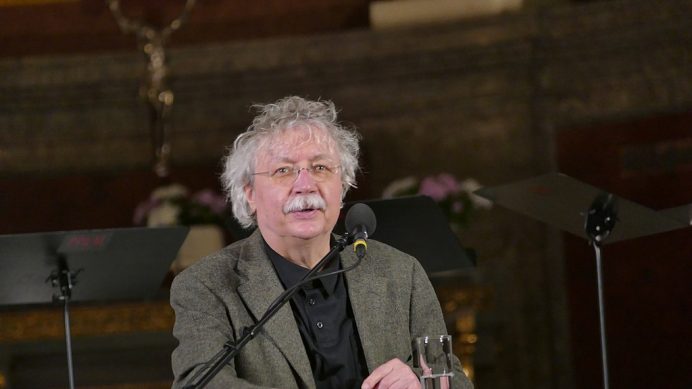Karl-Markus Gauß is editor in chief of the literary magazine Literatur und Kritik. This article first appeared in the Austrian daily newspaper der Standard. (English adaptation by Stan Nadel.)
When Iranian protests grew into a mass movement in 1978, the philosopher Michel Foucault decided to fly from Paris to Teheran. He wanted to understand what enabled the insurgents to sweep away the heavily armed regime of Shah Reza Pahlavi and to deprive the American imperialists of one of their most powerful vassals. In previous years, Foucault had published influential studies developing the thesis that the European Enlightenment’s development of bourgeois discipline had its way paved institutionally in prisons, while a true ‘dungeon system’ was tested in clinics, until it had finally subjugated the entire society. The Iranian revolution fascinated him, precisely because it was not a revolution based on a western, eastern, bourgeois or Bolshevik model, but had instead brought something new into the world. He called it ‘political spirituality’ and he meant by this the unity of anti-imperialist struggle and Shiite martyrdom. In short, the atheist, critic of bourgeois states and theoretician of anti-colonialism had discovered Islamism.
Foucault wrote enthusiastic articles about this new form of revolution in the French press and was invited to an audience with Ayatollah Khomeini, who was still living in exile in Paris. He was apparently neither willing nor able to apply to the developing theocracy of Iran the same critical instruments which he had used for his analysis of bourgeois civil society and which had led him to reject it. Even later he didn’t say a word about the fact that the Islamists had hijacked the revolution—had persecuted its opponents with bloody trials and imposed a patriarchal coercive rule on Iranian women, while instituting antisemitism as a state doctrine. He only got really angry when some feminist Iranian women in exile in France called him out about his turning a blind eye to the disenfranchisement of women. Then he told them that they were doing nothing other than fomenting Western prejudices against Islam with their criticism, and that they had not understood what the historical moment demanded: to put their own concerns aside in favour of the unique chance to finally free the earth from the damnation of capitalism and its European legacy.
To this day, no one has been given as negative a reception from some left-wing intellectuals in the West as those opposition members from Islamic countries who don’t consider human rights to be mere lies and deception based on European supremacy, but who have the temerity to insist on their universal validity and denounce religious despotism. They have been slandered as collaborators with imperialism, constantly fuelling Islamophobia. Self-righteous citizens of the colonial powers of yesterday, who are immersed these days in an anti-colonialist milieu, now claim without any compunction and with unbroken arrogance, the authority to explain to residents of the former colonies how they should behave in global decolonisation!
What is it that makes many self-declared ‘anti-imperialists’ sympathise with reactionary despotisms? I think that it’s their constant search for something that they can no longer find in their own countries of prosperity: some revolutionary class, stratum, group that has what it takes to liberate humanity from oppression and alienation through its own emancipation. In the Marxist view of things, the international working class was called upon to do this work. But after all the economic, social and technological developments of recent decades, its fragmentation as a class and the accompanying politically driven de-solidarisation, hardly anyone trusts it to do this task anymore.
For sixty years, the revolutionary spirits of the West have been looking for a replacement. First, it was the liberation movements of Asia or Latin America whose heroic struggles—which were started and conducted under completely different conditions—were to serve as a model for the whole world; then it was the ostracised, outcast, and marginalised people of the highly developed capitalist countries who were charged with the hope that their revolt would lead to a solidarity-based society of tomorrow. And in the current epoch of woke campus radicalism, any group of victims, and the supposedly or actually disadvantaged, become projection surfaces for revolutionary concerns and hopes.
Even the fact that homosexuality became punishable by death in the mullahs’ state did not cause Michel Foucault (who was permitted to live out his homosexuality freely under the supposedly coercive bourgeois regime of the west) to renounce his enthusiasm for ‘political spirituality.’ Since then, countless people have emulated his steadfast refusal to measure himself ideologically against something as banal as reality. Instead, they follow the changing fashions of pseudo-revolutionary attitudes. Even if sometimes it remains just an attitude, the matter is anything but harmless, as can be seen from the cheers that followed Hamas’s terrorist attack on 7 October 2023.
It may seem ridiculous, but it is a serious matter in both senses when some queer activists— apparently with suicidal disregard for what they are endorsing—express their solidarity with Hamas. One can only imagine how long a queer solidarity group would survive in the realm of Sharia [it’s worth noting that anti-Israel Palestinian LGBTQ activists have their headquarters in Tel Aviv and not in Ramallah]. But one doesn’t have to use imagination to see the enthusiasm that the annihilation of Israel, explicitly propagated by Hamas and Iran, generates among millions upon millions of sympathisers of these Palestinian ‘freedom fighters.’ The most prominent advocates of Hamas, Yanis Varoufakis and Judith Butler, waited until Israel reacted (as Hamas had no doubt expected) with counter-strikes, which have since resulted in the deaths of an appalling number of civilians in Gaza, before publicly denouncing the Israeli counter-attack while ignoring the gang of murderers who massacred more than 1,200 people on October 7thjust because they were Jews or associated with Jews [the sort of people that the Nazis had called ‘Jew servants’].
Others didn’t wait that long. Like some of her American counterparts, the Austrian Nicole Schöndorfer (who is very prominent on social media) rushed the very first day after the pogrom to celebrate on Instagram the terrorists who themselves died in the butchering of Jews as ‘martyrs.’ One remembers the atheist Foucault, who denounced religious criticism of the Islamist movement; so why should we be surprised by women who explicitly describe themselves as feminists and yet celebrate as martyrs of a just cause the young men who raped, mutilated, murdered or kidnapped Israeli women and presented them as trophies to the mob? A linguistic collateral damage of today’s misery is that laudable terms like anti-racism, anti-colonialism, and anti-imperialism are so thoroughly discredited by those who misuse them that one has to ask oneself whether new terms will be necessary in order to make linguistic sense of the old ones—to name them correctly to stand up against racism, colonialism, and imperialism.
A few weeks before the Hamas massacre, I was asked what was the easiest way to fuel antisemitism. Today I would have to answer: by massacring as many Jews as possible. Nothing has fuelled hatred of Jews more than the worst attack on Jews since the Shoah, and because the attack was carried out against Jews, the rapists and murderers can only be called ‘resistance fighters’ motivated by a ‘holy Hatred’ against foreign Jewish rule in Palestine. ‘Heilige Hass’ (holy hatred) is, by the way, a motif that literally comes from Julius Streicher’s Nazi magazine Der Stürmer and which has been taken over in anti-colonial discourse. There are forms of ignorance that are entirely culpable. One of these is when Israel haters, who see themselves as left-wing, simply refuse to acknowledge the political foundations of Hamas.
Hamas has never made a secret of the fact that it is not concerned with national equality, social justice or a so-called ‘two-state solution’, but only with the destruction of Israel—which Hamas says represents the most important stage in the battle for final victory between believers and unbelievers. Its foundational charter from 1988 is a compact collection of anti-Semitic stereotypes and a blatant declaration of intent: that an Islamic theocracy will one day be established ‘between the river and the sea.’
When the Israeli army withdrew from Gaza in 2005, Hamas won free elections. Richly supplied with funds from all over the world, it then had the opportunity to establish self-government for the benefit of the residents of Gaza. But that was not its goal; rather, it quickly set about liquidating its Palestinian opponents and imposing a series of fundamentalist laws on the population. Hamas has done everything in its power to turn Gaza into the ‘largest open-air prison in the world,’ while denying that it was they who had created it. In 1970, after Israel had taken over Gaza, 280.000 people lived there. When Israel withdrew completely in 2005 there were about 1.2 million residents, and after fewer than twenty more years there are now 2.2 million: This is what the demographic development looks like when the ‘Zionist aggressor’ engages in ‘genocide’ for more than five decades.
Forty-five years after Foucault abandoned his intellectual and moral standards to support ‘political spirituality,’ the most sensitive youth in the West are forming an alliance with one of the most brutal terrorist representatives of ‘political spirituality.’ There are some new things that the anti-Zionists put forward between Berkeley and Berlin—such as the rigorous rejection of the Enlightenment legacy, which is denounced in self-loathing as a weapon of white supremacy; but the core of their accusation is ancient.
Jean Améry: an alternative to Foucault
In the decade before his suicide in 1978, Jean Améry rushed to publish one clairvoyant essay after another, in which he passionately warned ‘the left,’ to which he had always felt a part, that ‘antisemitism is about to become an integral part’ of the socialist movement. In 1969 he spoke of a ‘left that forgets itself’ and whose anti-Zionism contained antisemitism ‘like the thunderstorm in the clouds.’ Using revolutionary phrases, the vulgar old antisemitism became the new ‘respectable antisemitism’ of supposedly progressive people. Améry did not argue complacently from a sense of moral superiority, but rather from the bleak realisation that his ‘natural friends’, the rebellious students, did not want to hear what he had to say. That they believed that they were standing up for a better world of tomorrow when they chanted at their demonstrations: ‘Kill the Zionists dead, make the Middle East red.’ He explained to them why he heard echoes of the old antisemitic cry ‘Juda verrecke’ [Judah perish] in their slogan and why they were calling for nothing other than that the Jews must be destroyed so that peace and freedom can return to the world.
In the current situation, the author of an important biography of Jean Améry (Irene Heidelberger-Leonhard) has now put together a collection of essays, treatises and speeches by Améry that bears the title Der neue Antisemitismus* [The New Antisemitism]. It is shocking that these texts, written by Améry fifty or more years ago, read like they had been freshly written for today. Between 1969 and 1978, Améry’s trenchant warnings were dismissed as the quirk of a writer out of time; today they demonstrate an almost prophetic power.
Améry never said a word that denied the Palestinians’ right to land or national self-development and statehood. It was completely strange to him when the modern state of Israel derived political claims from biblical legends. He would probably have denounced Benjamin Netanyahu, the godfather of the extremist settler movement and corrupt enemy of democracy, even more harshly than he had denounced Menachem Begin at the time. After the Six-Day War, he pondered ‘the limits of solidarity’ with Israel, and he would certainly have condemned the never-ending bombing of the Gaza Strip.
It is not without reason that these days many people sometimes complain that the political debate is no longer about knowledge, but rather only about demonstrating a loyal commitment to one side or the other. However, I must note: antisemitism did not come into the world through Jewish misbehaviour, and it will not disappear from it through Jewish good behaviour. Of course, Hamas cannot achieve its openly declared goal of wiping out Israel [at least not alone]; but on the day of the massacre it had already achieved things that millions and millions wanted. It is therefore necessary to offer protection and security to Jews who are threatened everywhere, through personal courage, social initiatives and government laws. And, especially if you feel politically connected to the left like I do, to support the state of Israel and its right to self-defence.
*Jean Améry: Der neue Antisemitismus. With a forward by Irene Heidelberger-Leonhard. Klett-Cotta-Verlag, Stuttgart, 2024, pp. 128.




































